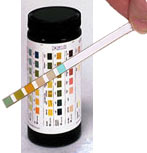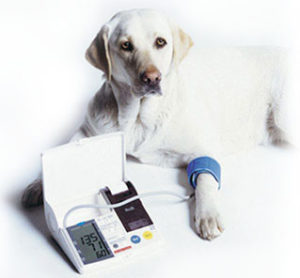Basically, kidney disease in dogs is diagnosed by measuring the levels of two waste products in the blood: blood urea nitrogen (BUN) and creatinine. A urinalysis rounds out the testing.
Here is a bit more detail.
Urinalysis
 When your vet asks you to bring in a urine sample from your dog, try and get the first urine of the day – mid stream is preferable, and try and get it to the vet within a couple of hours of collection.
When your vet asks you to bring in a urine sample from your dog, try and get the first urine of the day – mid stream is preferable, and try and get it to the vet within a couple of hours of collection.
The urine is tested for:
Urine specific gravity: Measures how concentrated the urine is. The lower the specific gravity, the more serious the kidney problem is likely to be.
Protein: Elevated amounts of protein in the urine, may be the first sign of kidney problems. White blood cells and debris in the urine help determine if it is acute or chronic.
Sediment: The urine is centrifuged for analysis under a microscope. Red or white blood cells help determine the cause.
Chemistry panel
 Blood urea nitrogen (BUN): Is a waste product excreted by the kidneys. If the kidneys are not working properly it will build up in the blood, and the higher the level, the more serious the problem.
Blood urea nitrogen (BUN): Is a waste product excreted by the kidneys. If the kidneys are not working properly it will build up in the blood, and the higher the level, the more serious the problem.
Creatinine: The kidneys are the only organs that excrete this substance, and if creatinine builds up to higher than normal levels, it is a sign of decreased or impaired functioning of the kidneys.
Phosphorus: The foods your dog eats are likely very high in phosphorus. As kidneys fail they are not able to effectively excrete phosphorous into the urine, so levels increase.
Potassium: When kidneys fail, potassium levels rise, causing fatigue, nausea and an irregular, slow heartbeat that can be life threatening. However, when appetite is lost because of advanced kidney disease, blood potassium level can fall dangerously low.
**Frequent monitoring of blood urea nitrogen and creatinine levels, help your vet determine if his/her treatment plan is working.
Complete Blood Count (CBC)
A CBC is done to check for anemia, the result of a decrease in the hormone involved in the production of red blood cells (common with kidney disease).
Electrocardiogram (ECG)
May be used to assess heart function, affected by high potassium levels.
 Blood Pressure
Blood Pressure
High blood pressure is common in chronic kidney disease. It is known to damage the kidneys, but kidney disease is known to elevate blood pressure.
Because it is difficult to test blood pressure in dogs, your vet may not be able to find out whether or not your dog has it. He or she will decide on the best course of action in this case.
Imaging techniques
Radiography: This is done to check the size of the kidneys. Small being more common in chronic kidney disease, while large could mean acute or other diseases.
Ultrasonography: Used to check for changes in kidney density.
Diagnosing kidney disease in dogs – conclusion
I didn’t want to get too “medical” here – that’s what your vet is for. I simply wanted to give you a general idea of the things your vet might do to confirm/or dismiss a diagnosis of kidney disease.
Your vet will go into details about what tests he recommends, and why. If you’re unclear about something, never be afraid to ask.

 Dog Tornado Activity Toy Review
Dog Tornado Activity Toy Review
Thanks for sharing Kidney Disease in Older Dogs: How Is It Diagnosed?
I found this very helpful as a guideline to what is needed to test for kidney disease. I think that urine analysis would be the easiest to do as it’s not hard to get urine. It’s more difficult to get blood from your dog and it might hurt.
How common is kidney disease in senior dogs?
Hi Dinh, thanks for your comment. Urine is definitely easier to get – stick a bowl under them when they pee and there’s your sample. Apparently my dog is an angel when they take blood, but I’m sure she doesn’t love it. Kidney disease is very common in senior dogs, and senior cats as well.
Hi Hindy!
I have had my share of kidney infections and God knows they are painful. It seems like the wya to diagnose one in dogs is the same way as it is for humans. Levels of protein and creatinine are also elevated when one has a kidney infection. As I was reading your article though, I was thinking of how difficult it must be to get a urine sample from a pet. Any tips? And do you know if dogs also feel pain in their kidneys when they have an infection?
Hi Emily, so nice to hear from you again. Actually a urine sample is quite easy – you stick a bowl or a tin foil pan (something relatively shallow) under their butts and let them pee into it. Having said that I’m used to my very cooperative sweetie Red. I can’t imagine how I would get my other brat to cooperate. When a sample can’t be gotten voluntarily, they will take it, literally!! According to my vet, kidney disease isn’t painful. However if you’re talking about a urinary tract infection, that’s uncomfortable. They keep having to pee, and even afterwards, they feel like they still have to pee so it’s constant back and forth.
Thank you for this information, we have a dog in the house. Take from the orphan he has something disease. but we cannot identify what kind is it, he’s not really old, maybe he get this from the place his stays before. Thank you for this information we can help him cure his disease.
Hello Renelyn, thank you for your comment. Nice to hear you rescued a dog, but I don’t think you can cure his disease by reading this article. I hope you will be taking him to see a vet in order to have him diagnosed and treated properly.
Hi Hindy,
complete story and information about kidney disease in dogs. I personally have one beautiful german shepherd and everything about the dogs is interesting for me. Thanks for a thorough story about this disease.
Hello Sasa, I’m glad you found the information helpful. Shepherds are such incredibly beautiful dogs, I hope you will find this resource helpful when your dog gets older.